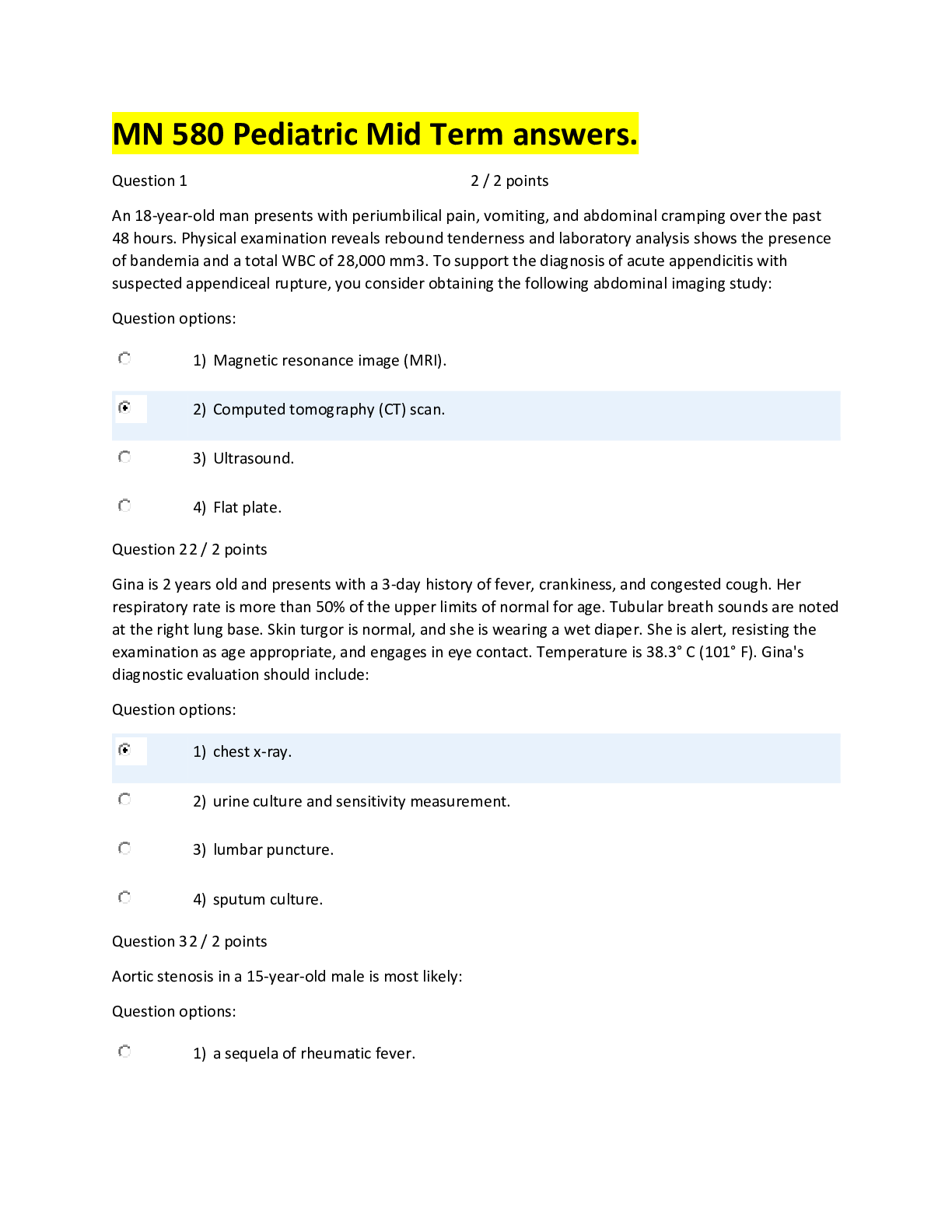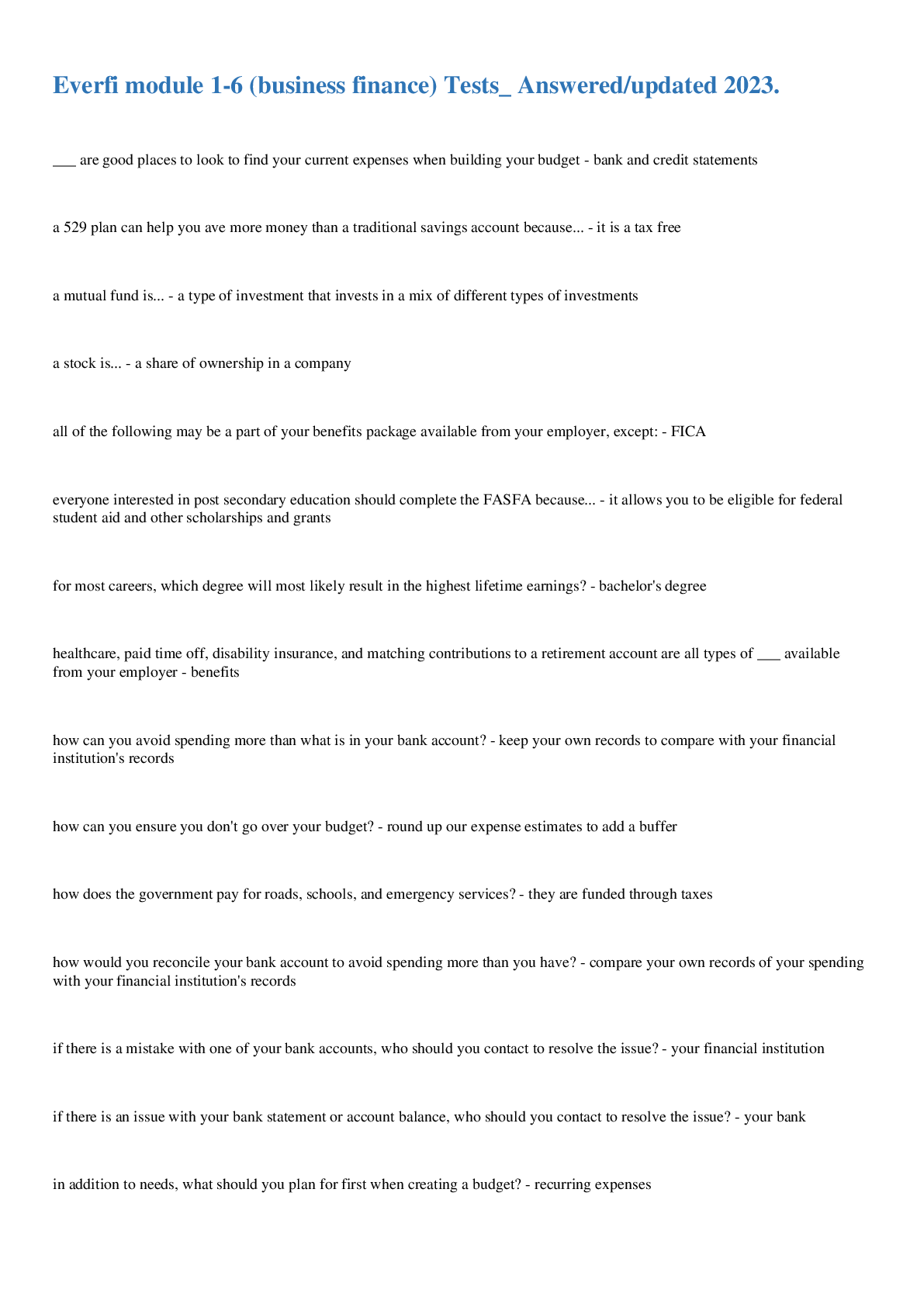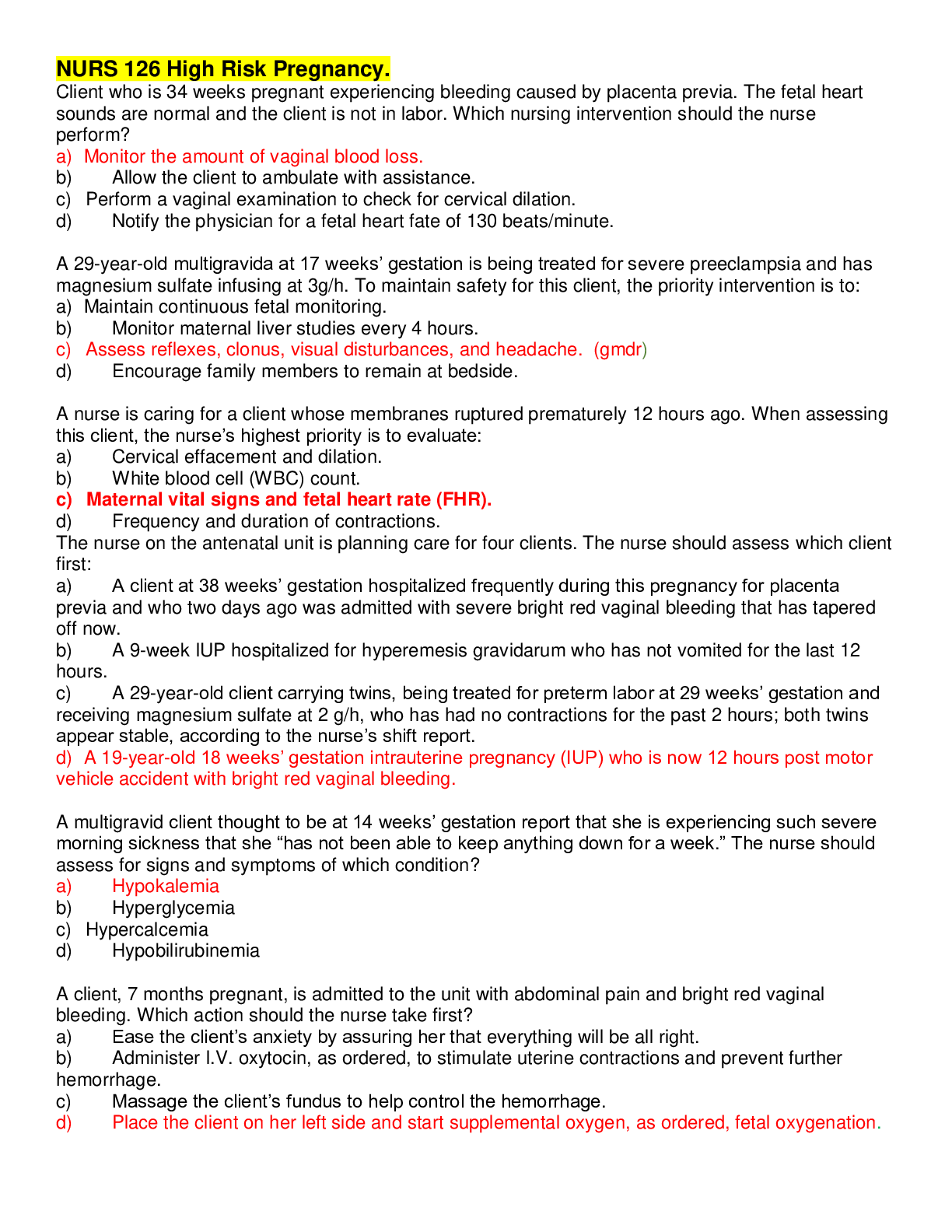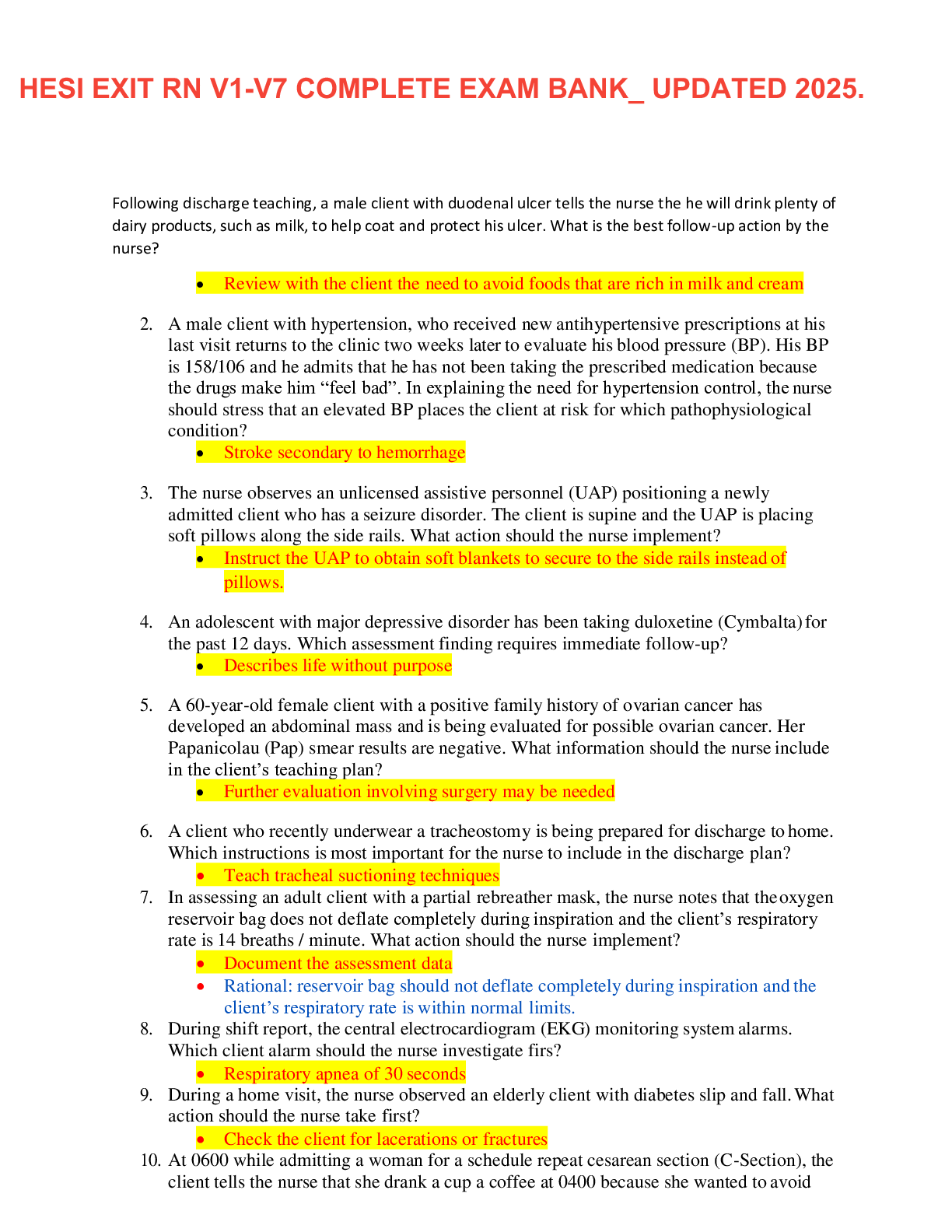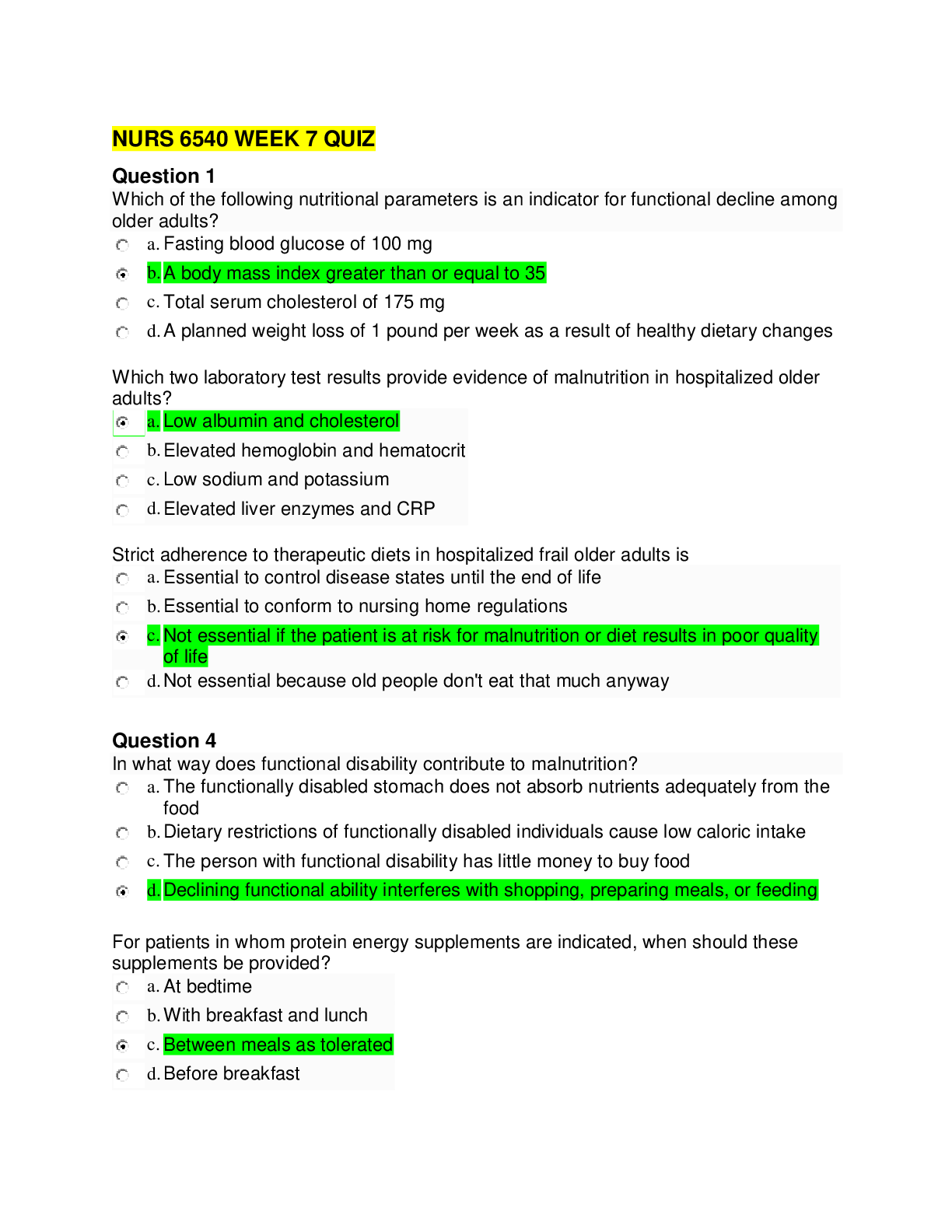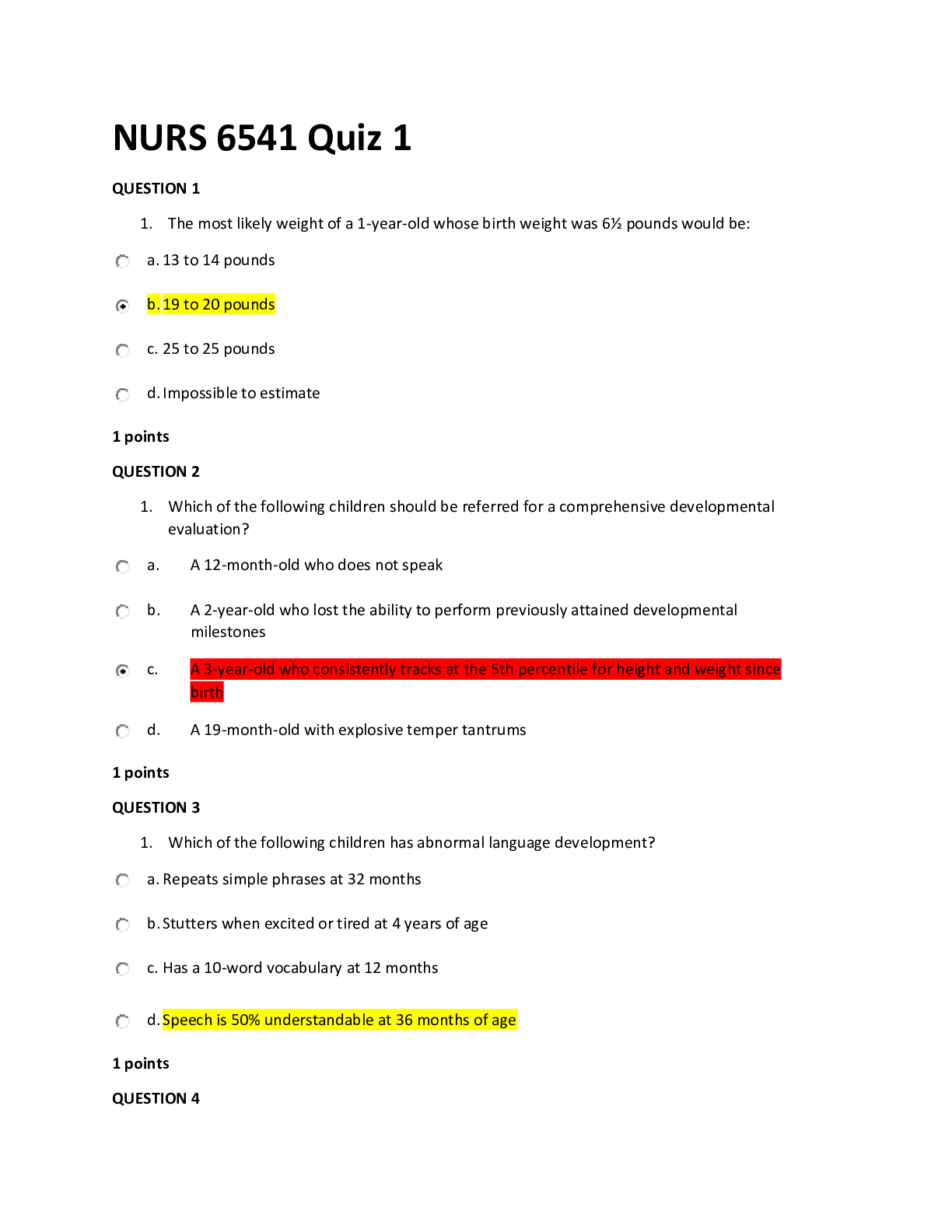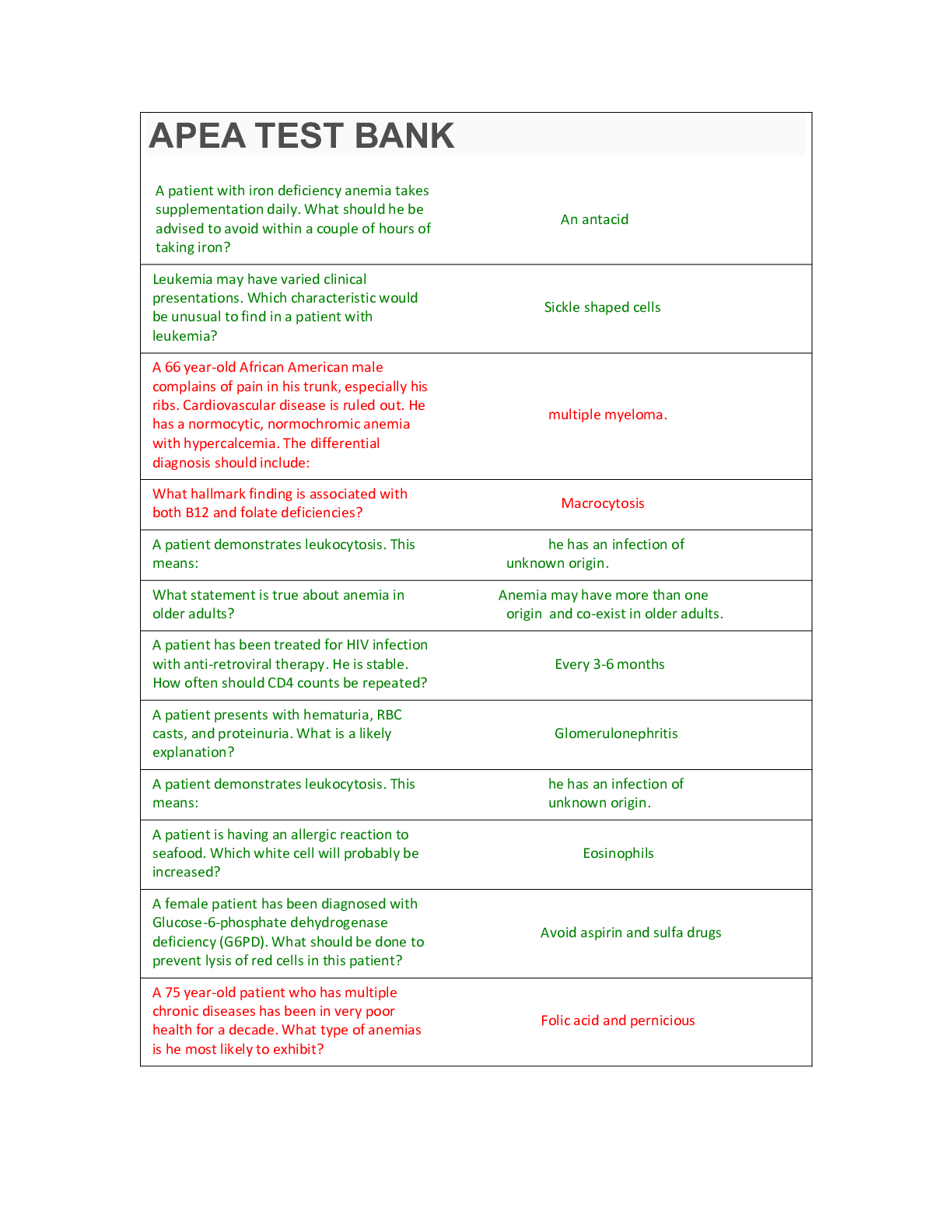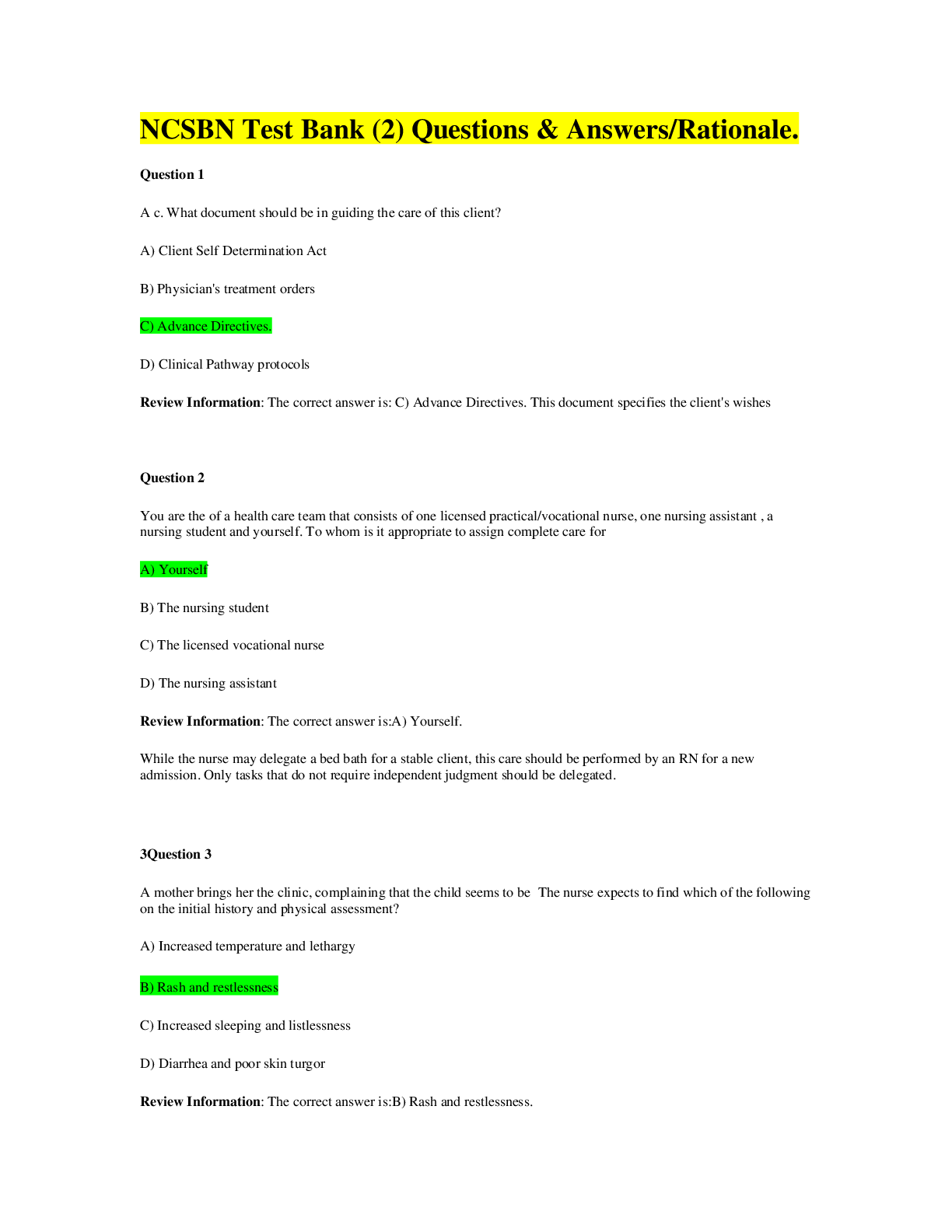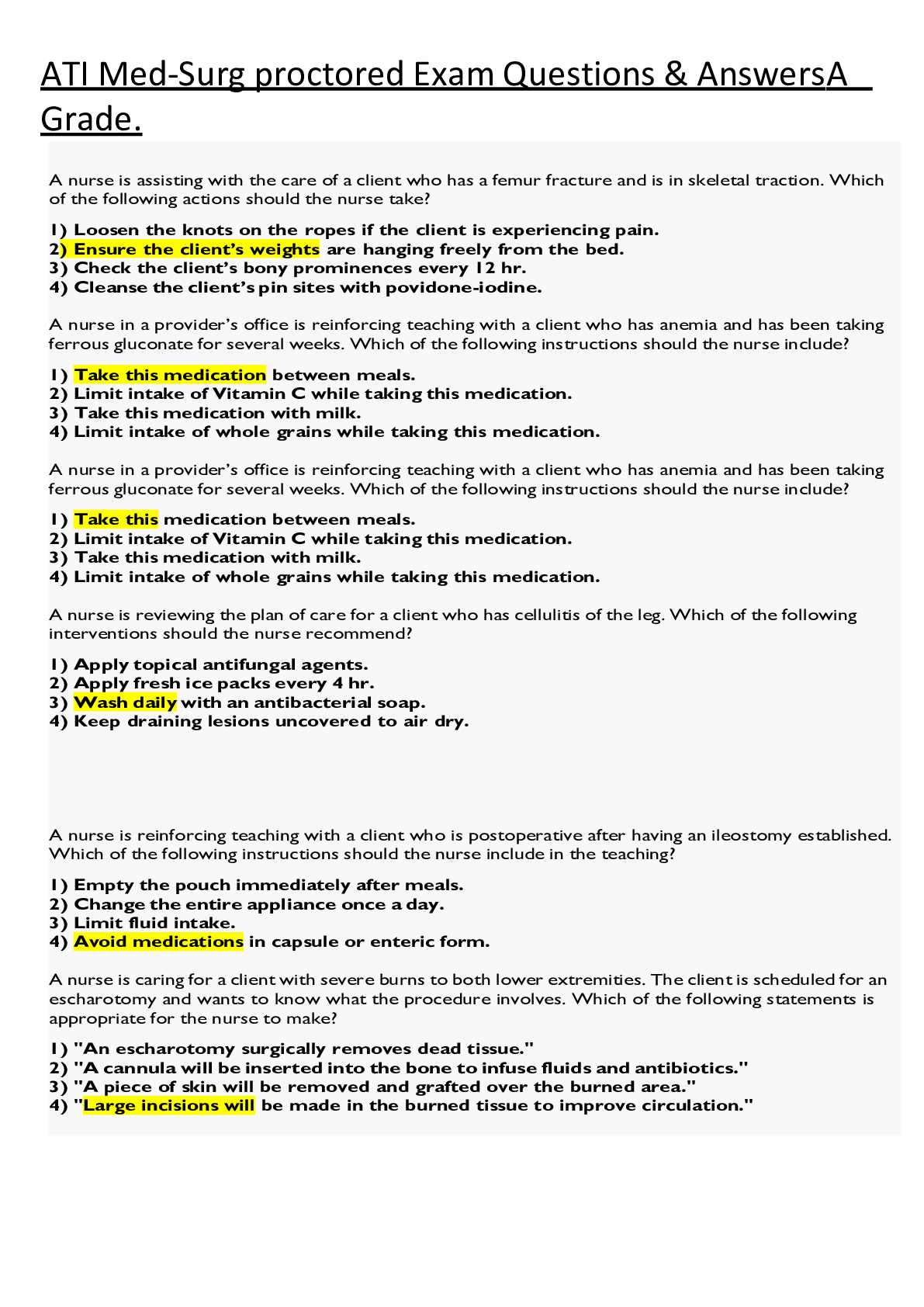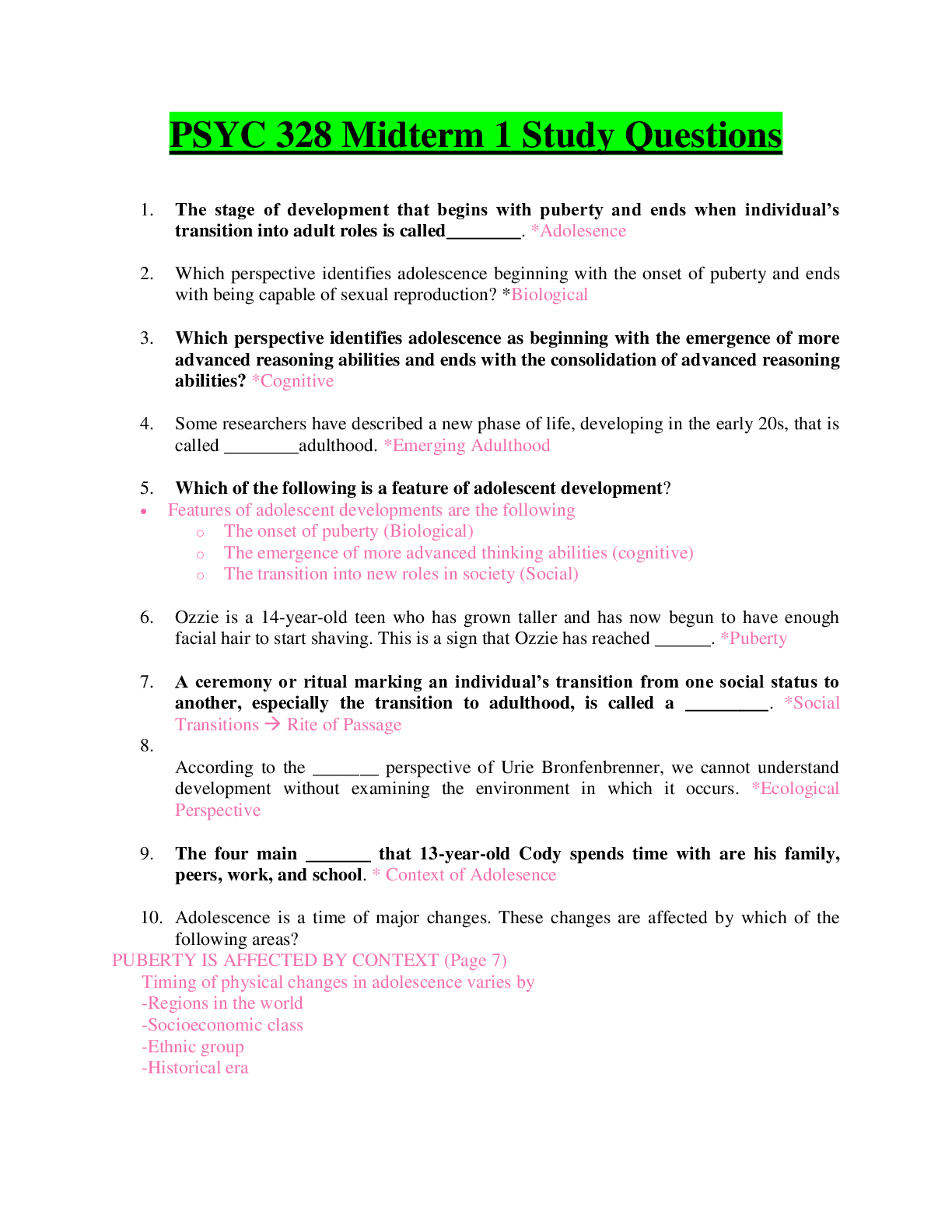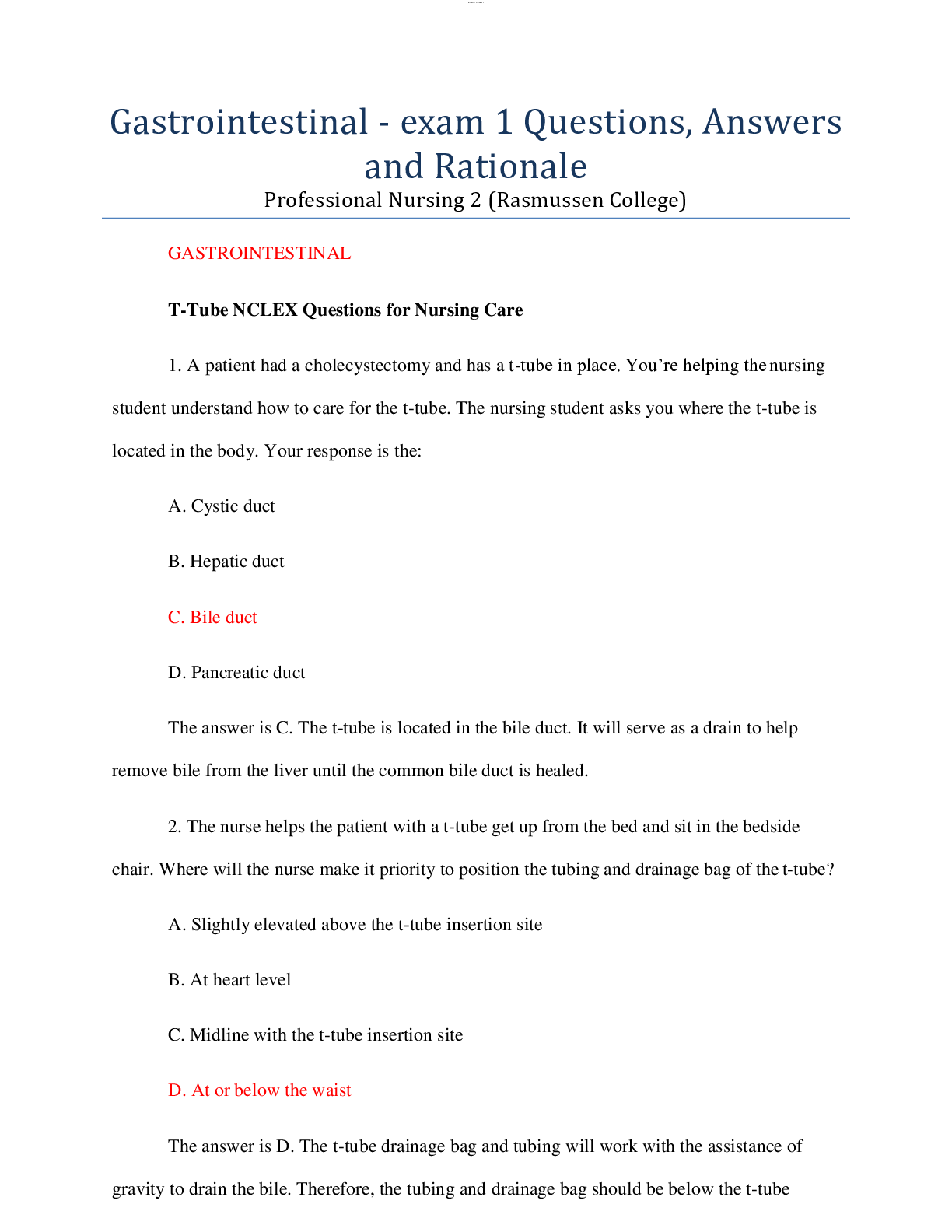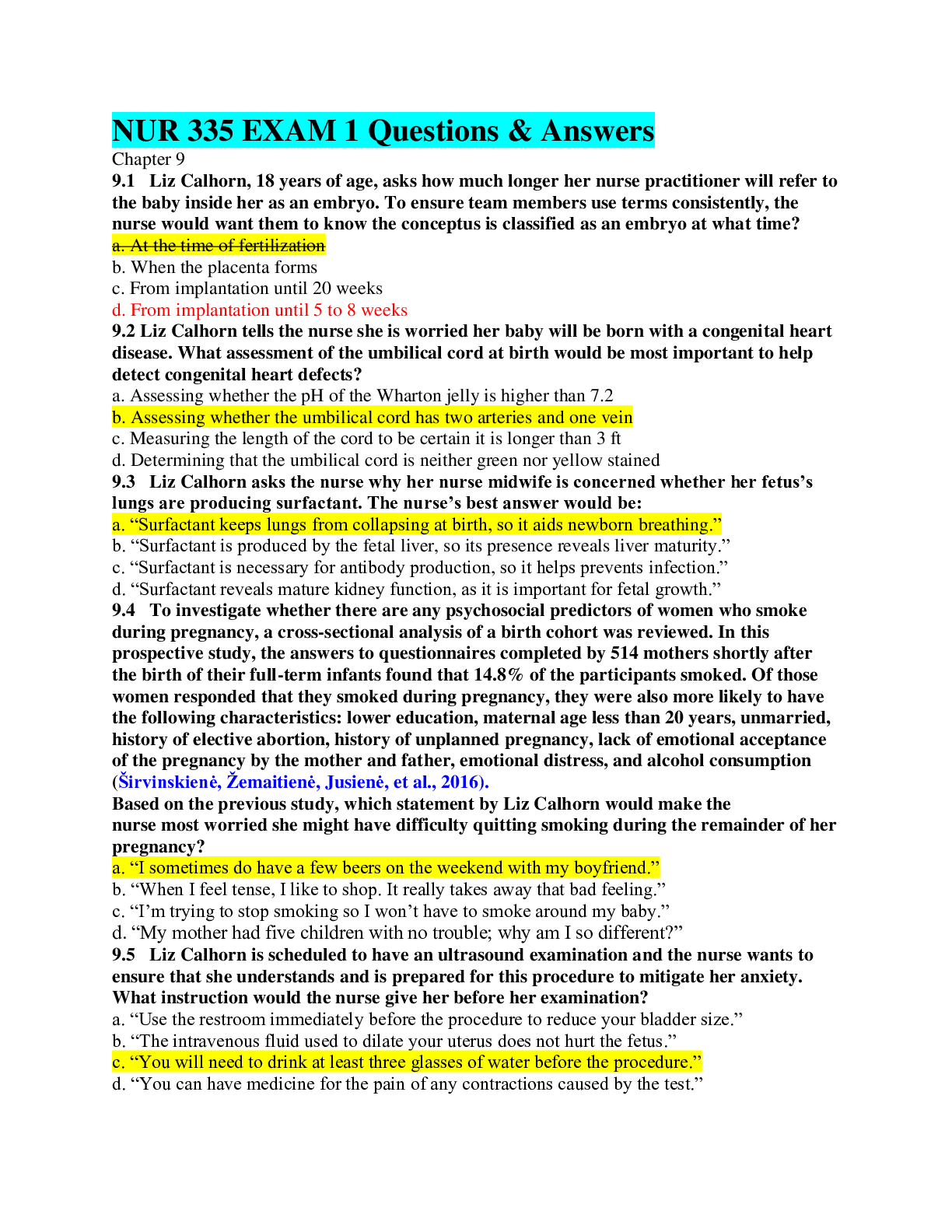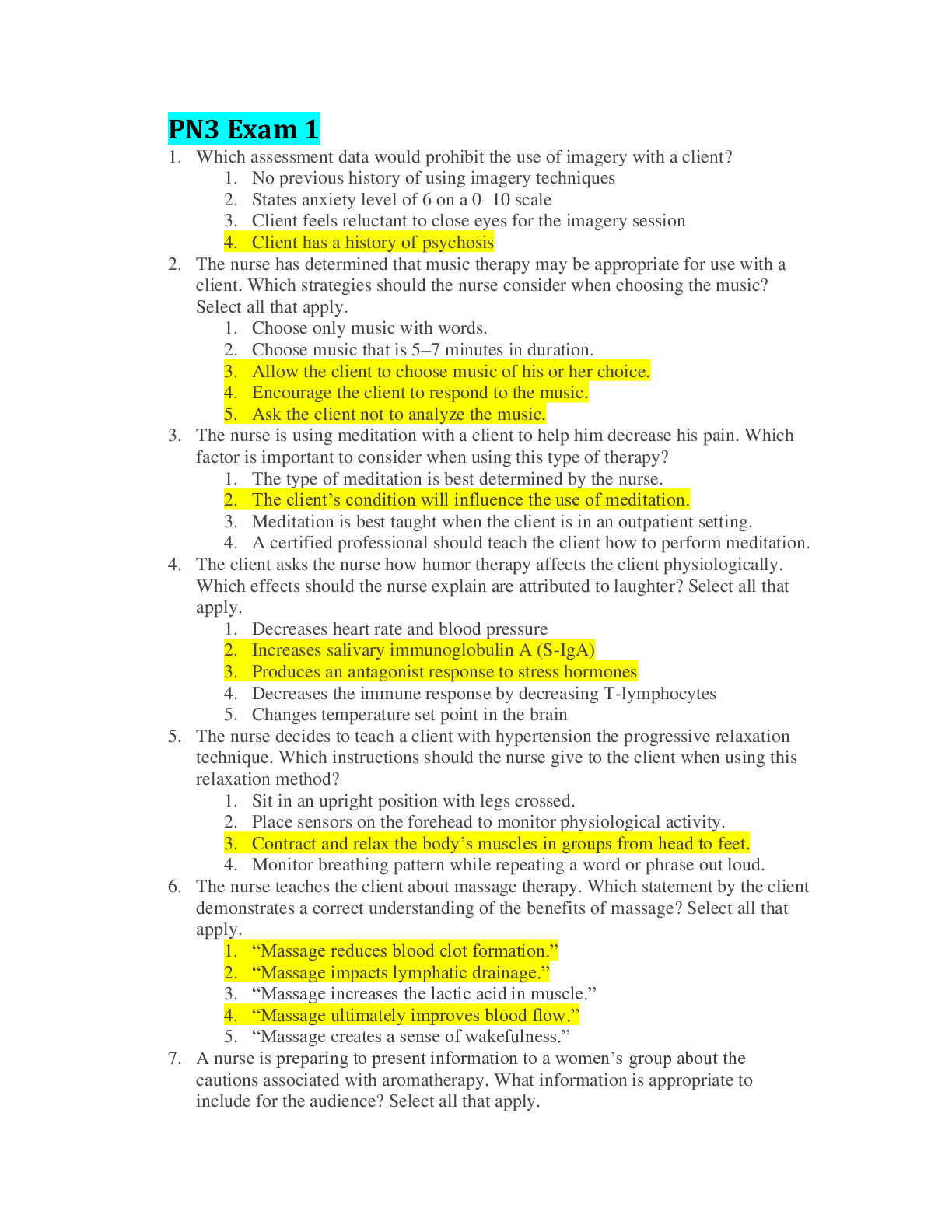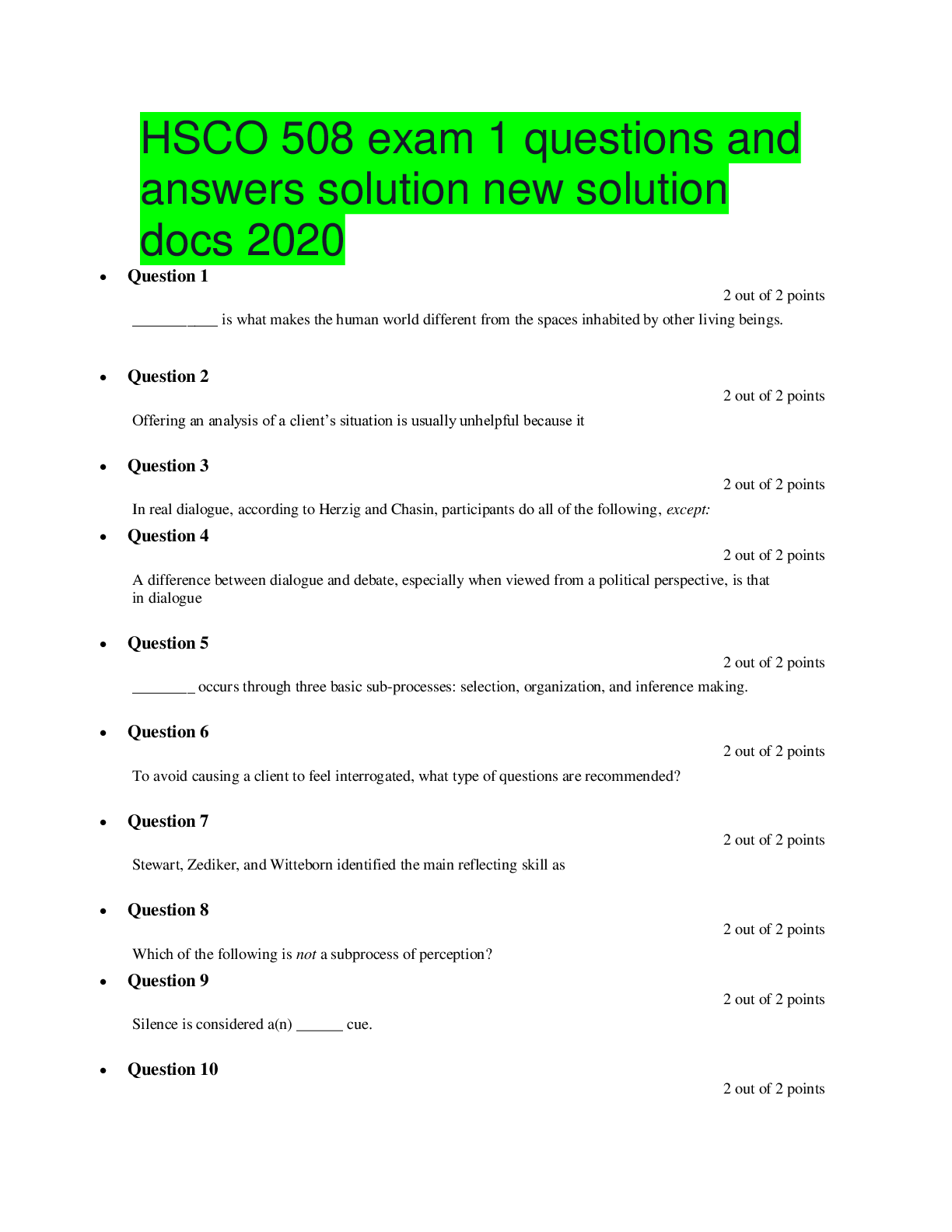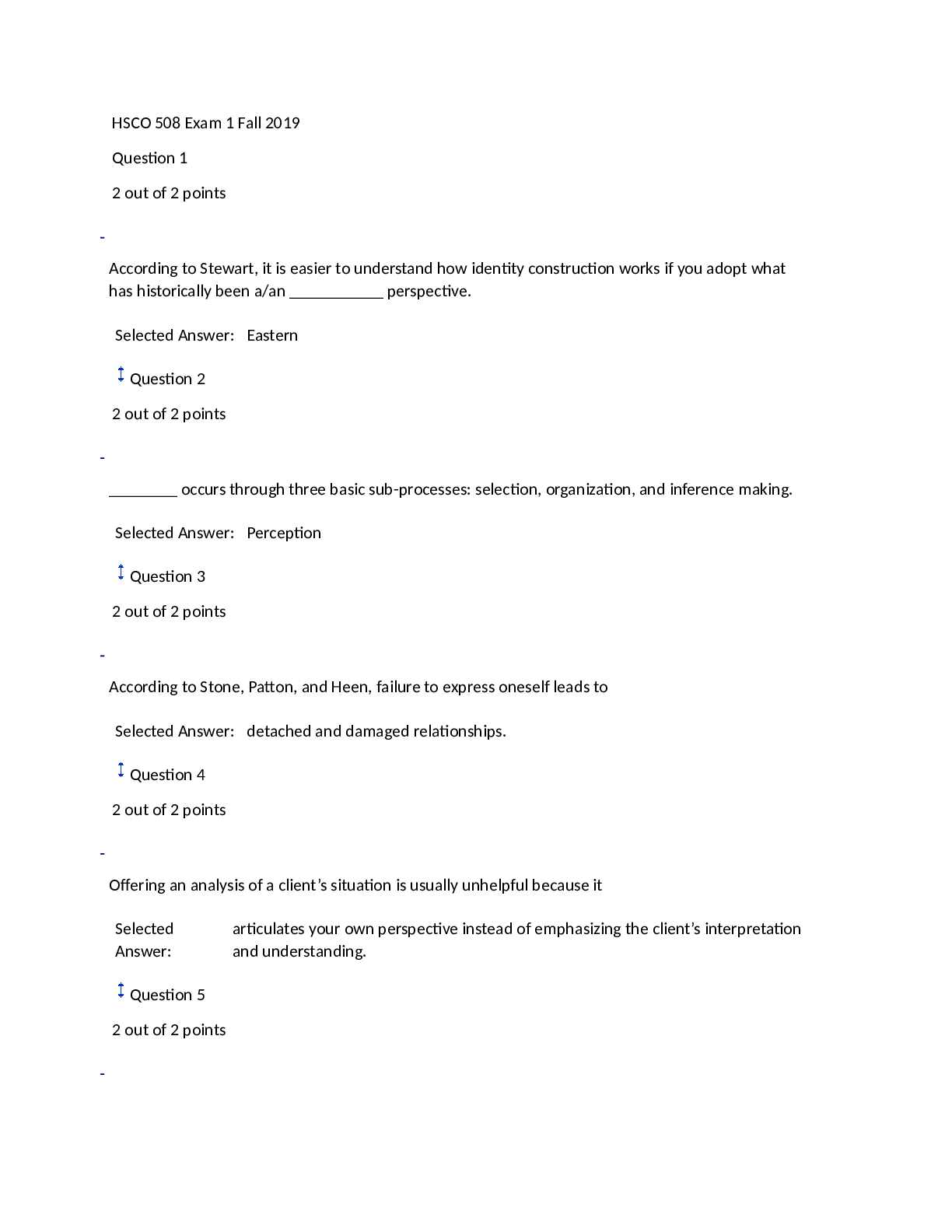*NURSING > QUESTIONS & ANSWERS > NURSING 1192 Exam 1 Questions & Answers : Modules 1 - 4 Latest Complete Solution Guide,Rasmussen Col (All)
NURSING 1192 Exam 1 Questions & Answers : Modules 1 - 4 Latest Complete Solution Guide,Rasmussen College, Moorhead.
Document Content and Description Below
NURSING 1192 Exam 1 Questions & Answers. (answer key below) Module 1 Chapter One: 1. In which scenario is it most urgent for the nurse to act as a patient advocate? a. An adult cries and experienc... es anxiety after a near-miss automobile accident on the way to work. b. A homeless adult diagnosed with schizophrenia lives in a community expecting a category 5 hurricane. c. A 14-year-old girl’s grades decline because she consistently focuses on her appearance and social networking. d. A parent allows the prescription to lapse for 1 day for their 8-year-old child’s medication for attention-deficit/hyperactivity disorder. 2. The nurse interacts with a veteran of World War II. The veteran says, “Veterans of modern wars whine and complain all the time. Back when I was in service, you kept your feelings to yourself.” Select the nurse’s best response. a. “American society in the 1940s expected World War II soldiers to be strong.” . “World War II was fought in a traditional way but the enemy is more difficult to identify in today’s wars.” c. “We now have a better understanding of how trauma affects people and the importance of research-based, compassionate care.” d. “Intermittent explosive devices (IEDs), which were not in use during World War II, produce traumatic brain injuries that must be treated.” 3. A patient reports to a primary care provider about sleeplessness, constant fatigue, and sadness. In our current health care climate, what is the most likely treatment approach that will be offered to the patient? a. Group therapy b. Individual psychotherapy c. Complementary therapy d. Psychopharmacological treatment 4. The nurse prepares outcomes to the plan of care for an adult diagnosed with mental illness. Which strategy recognizes the current focus of treatment services for this population? a. The patient’s diagnoses are confirmed using advanced neuroimaging techniques. b. The nurse confers with the treatment team to verify the patient’s most significant disability. c. The nurse prioritizes the patient’s problems in accordance with Maslow’s hierarchy of needs. d. The patient and family participate actively in establishing priorities and selecting interventions. 5. Which scenario best demonstrates empathetic caring? a. A nurse provides comfort to a colleague after an error of medication administration. b. A nurse works a fourth extra shift in 1 week to maintain adequate unit staffing. c. A nurse identifies a violation of confidentiality and makes a report to an agency’s privacy officer. d. A nurse conscientiously reads current literature to stay aware of new evidence-based practices. Chapter 2: 1. A mentally ill gunman opens fire in a crowded movie theater, killing six people and injuring others. Which comment about this event by a member of the community most clearly shows the stigma of mental illness? a. “Gun control laws are inadequate in our country.” b. “It’s frightening to feel that it is not safe to go to a movie theater.” c. “All these people with mental illness are violent and should be locked up.” d. “These events happen because American families no longer go to church together.” 2. The nurse presents a class about mental health and mental illness to a group of fourth graders. One student asks, “Why do people get mentally ill?” Select the nurse’s best response. a. “There are many reasons why mental illness occurs.” b. “The cause of mental illness is complicated and very hard to understand.” c. “Sometimes a person’s brain does not work correctly because something bad happens or they inherit a brain problem.” d. “Most mental illnesses result from genetically transmitted abnormalities in cerebral structure; however, some are a consequence of traumatic life experiences.” 3. An adult experienced a spinal cord injury resulting in quadriplegia 3 years ago and now lives permanently in a skilled care facility. Which comment by this person best demonstrates resiliency? a. “I often pray for a miracle that will heal my paralysis so I will be whole again.” b. “I don’t know what I did to deserve this fate or whether I am tough enough to endure it.” c. “My accident was a twist of fate. I suppose there are worse things than being paralyzed.” d. “Being paralyzed has taken things from me but it hasn’t kept me from being mentally involved in life.” 4. A nursing assistant says to the nurse, “The schizophrenic in room 226 has been rambling all day.” When considering the nurse’s responsibility to manage the ancillary staff, which response should the nurse provide? a. “It is more respectful to refer to the patient by name than by diagnosis.” b. “Thank you for informing me about that. I will document the behavior.” c. “It is not unusual for schizophrenics to do that. It’s just part of their illness.” d. “You have a difficult job. I’m glad you are so accepting of our patients’ behaviors.” 5. Which scenario meets the criteria for “normal” behavior? a. An 8-year-old child’s only verbalization is “No no no.” b. A 16-year-old girl usually sleeps for 3 or 4 hours per night. c. A 43-year-old man cries privately for 1 month after the death of his wife. d. A 64-year-old woman has difficulty remembering the names of her grandchildren. Chapter Three: 1. A nurse plans a group meeting for adult patients in a therapeutic milieu. Which topic should the nurse include? a. Coping with grief and loss b. The importance of hand washing c. Strategies for money management d. Staffing shortages expected over the next 3 days 2. Considering Maslow’s pyramid, which comment indicates an individual is motivated by the highest level of need? a. “Even though I’m 40 years old, I have returned to college so I can get a better job.” b. “I help my community by volunteering at a thrift shop that raises money for the poor.” c. “I recently applied for public assistance in order to feed my family, but I hope it’s not forever.” d. “My children tell me I’m a good parent. I feel happy being part of a family that appreciates me.” 3. Which patient is likely to achieve maximum benefit from cognitive behavioral therapy (CBT)? a. Older adult diagnosed with stage 3 Alzheimer’s disease b. Adult diagnosed with schizophrenia and experiencing delusions c. Adult experiencing feelings of failure after losing the fourth job in 2 years d. School-age child diagnosed with attention-deficit/hyperactivity disorder (ADHD) 4. An adult plans to attend an upcoming tenth high school reunion. This person says to the nurse, “I am embarrassed to go. I will not look as good as my classmates. I haven’t been successful in my career.” Which comment by the nurse addresses this cognitive distortion? a. “You look fine to me. Do think you will have fun at your reunion?” b. “Everyone ages. Other classmates have had more problems than you.” c. “Do you think you are the only person who has aged and faced difficulties in life?” d. “I think you are doing well in the face of the numerous problems you have endured.” 5. A distraught 8-year-old girl tells the nurse, “I had a horrible nightmare and was so scared. I tried to get in bed with my parents but they said, ‘No.’ I think I could have gone back to sleep if I had been with them.” Which family dynamic is likely the basis of this child’s comment? a. Boundaries in the family are rigid. b. The family has poor differentiation of roles. c. The girl is enmeshed in part of a family triangle. d. Generational boundaries in the family are diffuse. Chapter Four: 1. A patient is diagnosed with an abscess in the cerebellum. Which nursing diagnosis has priority for the plan of care? a. Risk for falls related to loss of balance and equilibrium b. Unilateral neglect related to impairments to perception c. Impaired physical mobility related to spasticity and changes in muscle tone d. Risk for impaired cerebral tissue perfusion related to obstruction secondary to infection 2. A patient begins a new prescription for risperidone (Risperdal). Which intervention should the nurse include in the plan of care? a. Monitor intake and output daily. b. Educate patient about foods that contain tyramines. c. Assess sitting, standing, and lying blood pressure daily. d. Administer with food to reduce gastrointestinal irritation. 3. Systematic measurement of body weight, body mass index (BMI), waist circumference, and glucose levels would be most important for a patient beginning a new prescription for which medication? a. Aripiprazole (Abilify) b. Olanzapine (Zyprexa) c. Ziprasidone (Geodon) d. Quetiapine (Seroquel) 4. A patient tells the community mental health nurse, “I told my health care provider I was having trouble sleeping and he prescribed trazodone 50 mg every night. I read on the internet that drug is an antidepressant, but I’m not depressed. What should I do?” Which response by the nurse is correct? a. “I will help you contact your health care provider for clarification regarding this new prescription.” b. “Insomnia and depression usually go hand-in-hand. If your depression is relieved, your sleep will improve.” c. “In low doses, trazodone helps relieve insomnia. Higher doses are needed for antidepressant effects to occur.” d. “Information on the internet is often misleading and incorrect. It’s more important to trust the judgment of your health care provider.” 5. Which patient would the nurse expect to have the most difficulty with problem solving and decision making? a. An 18-year-old diagnosed with bulimia nervosa at age 14; has taken oral doses of fluoxetine (Prozac) daily for 3 years b. A 46-year-old diagnosed with schizophrenia at age 24; has taken oral doses of clozapine (Clozaril) daily for 18 years c. A 62-year-old diagnosed with bipolar disorder at age 28; has taken oral divalproex sodium (Depakote) daily for 16 years d. A 52-year-old diagnosed with schizophrenia at age 21; has taken monthly injections of haloperidol (haldol decanoate) for 12 years Chapter Five: 1. A patient diagnosed with major depressive disorder tells the community mental health nurse, “I usually spend all day watching television. If there’s nothing good to watch, I just sleep or think about my problems.” What is the nurse’s best action? a. Refer the patient for counseling with a recreational therapist. b. Ask the patient, “What kinds of program do you like to watch?” c. Suggest to the patient, “Are there some friends you could call instead?” d. Advise the patient, “Watching television and thinking about problems makes depression worse.” 2. The nurse admits a patient experiencing hallucinations and delusional thinking to an inpatient mental health unit. The plan of care will require which service occurs first? a. Social history b. Psychiatric history c. Medical assessment d. Psychological evaluation 3. A nurse working in an acute care unit for adolescents diagnosed with mental illness says, “Our patients have so much energy. We need some physical activities for them.” In recognition of needs for safety and exercise, which activity could the treatment team approve? a. Badminton tournament b. Competitive soccer matches c. Intramural basketball games d. Line dancing to popular music 4. As Election Day nears, a mental health nurse studies the position statements of various candidates for federal offices. Which candidate’s commentary would the nurse interpret as supportive of services for persons diagnosed with mental illness? a. “Full parity insurance coverage for mental illness” b. “Coverage for biologically based mental illnesses” c. “Reimbursement for initial treatment of addictions” d. “Managed care oversight for mental illness services” 5. An experienced nurse in a major medical center requests a transfer from a general medical unit to an acute care psychiatric unit. Which organizational feature would best support this nurse’s successful transition? a. Assignment to medication administration for the first 6 months b. Working with a seasoned mental health technician for the first month c. Co-assignment with a knowledgeable psychiatric nurse for an extended orientation d. Staff development activities focused on developing therapeutic communication skills Module 2&3 Chapter Seven: 1. A nurse assesses a new patient whose chief concern is “daily crying spells.” Which comment from the patient would prompt the nurse to suspect a medical reason is causing the problem rather than depression? a. “I usually drink two or three cups of coffee in the morning.” b. “I often have headaches, especially when the pollen count is high.” c. “Years ago I had thyroid problems but they cleared up and I stopped the medicine.” d. “I recently had three moles removed because my doctor thought they were suspicious.” 2. A 55-year-old lives 100 miles from her parents and mother-in-law. In the past year, her father had back surgery, her mother broke her hip, and her mother-in-law had a cardiac event. Which nursing diagnosis is most applicable to the 55-year-old? a. Risk for complicated grieving related to impending deaths of parents b. Risk for injury related to frequent long drives to care for aging parents c. Risk for chronic low self-esteem related to overwhelming responsibilities d. Risk for caregiver role strain related to responsibilities for care of aging parents 3. A patient asks the psychiatric mental health registered nurse, “I’m having so much anxiety. I think hypnosis would help me. Will you do that for me?” When determining a response, which factor should the nurse consider? a. The patient’s current medication regime b. State regulations regarding scope of practice c. The patient’s level of participation within the therapeutic milieu d. The plan of care the multidisciplinary team has developed for the patient 4. The nurse plans care for a newly hospitalized patient experiencing panic level anxiety after an automobile accident. The patient has no physical injuries. When selecting goals from the Nursing Outcomes Classification (NOC), the nurse will a. Select outcomes related to patient learning. b. Focus first on the long-term goals for the patient. c. Individualize outcomes based on the patient’s needs. d. Confer with the patient about which outcomes the patient wants to achieve. 5. On an inpatient unit, one patient assaults another patient resulting in a small laceration. Considering the patients’ right to confidentiality, how will the nurse effectively document this event? a. Ensure unit safety by documenting the hostile and combative characteristics of the assaulting patient. b. Document in each patient’s medical record the events and actions taken, using initials of other patients involved. c. Document in both patients’ medical records that an occurrence (incident) report was prepared according to agency policy. d. Verbally report the events to other team members and minimize written documentation in order to reduce potential legal consequences. Chapter Eight: 1. An adult experiencing a recent exacerbation of ulcerative colitis tells the nurse, “I had an accident while I was at the grocery store. It was so embarrassing.” Select the nurse’s therapeutic response. a. “Most grocery stores have public restrooms available.” b. “Tell me more about how you felt when that happened.” c. “People usually have compassion about those types of events.” d. “Your disease is now in remission so that is not likely to happen again.” 2. A nurse counsels a widow whose husband died 5 years ago. The widow says, “If I’d done more, he would still be alive.” Select the nurse’s therapeutic response. a. “I understand how you feel after such a terrible loss.” b. “That was a long time ago. Now it’s time to move on with your life.” c. “You did a very good job of caring for him, especially since he was sick so long.” d. “Your husband was 82 years old with severe chronic obstructive pulmonary disease.” 3. A patient has been out of work 3 weeks with a major illness and anticipates another month of recovery. The patient tells the nurse, “I’m trying to keep up with my work email from home. They hired a new person in my department but the person has no experience.” Select the nurse’s therapeutic response. a. “It sounds like you’re saying you are worried about your job security.” b. “No one expects you to keep pace with your job while you’re recovering.” c. “Your employer is required to hold your job for you while you’re on sick leave.” d. “Don’t worry about your job right now. It’s more important for you to recover.” 4. In which nurse-patient interaction would it be appropriate for the nurse to consider using touch? a. Comforting a tearful patient of Japanese heritage b. Counseling a child who was physically abused by a parent c. Welcoming a person of Hispanic heritage to a new group session d. Interacting with a Native American who has a hearing impairment 5. A nurse prepares a patient in a rural community for an initial telehealth visit with the health care provider. Select the nurse’s priority action. a. Ensure that the patient’s rights to privacy are respected. b. Ask the patient, “How much do you know about the Internet?” c. Inform the patient, “This experience will be like appearing on television.” d. Advise the patient, “You will be able to hear, but not see, your health care provider.” Chapter Nine: 1. Which comment by the nurse would be appropriate to begin a new nurse-patient relationship? a. “Which of your problems is most serious?” b. “I want you to tell me about your problems.” c. “I’m an experienced nurse. You can trust me.” d. “What would you like to tell me about yourself?” 2. A neighbor telephones the nurse daily, giving lengthy details about multiple somatic complaints and relationship problems. Which limit-setting strategy should the nurse employ? a. Suggest the neighbor call other people in the community. b. Say to the neighbor, “I can talk to you for 15 minutes twice a week.” c. Use the telephone’s caller identification to screen calls from the neighbor. d. Tell the neighbor, “You should discuss these concerns with your personal physician rather than me.” 3. A patient has been oppositional, demanding, and resistant to working on goals. A mental health nurse tells the nursing supervisor, “We finally had a serious talk. I let that patient know it’s time to get right with God and stop this behavior.” Recognizing the nurse’s actions were not acceptable, select the supervisor’s responding action. a. Review the facility policies regarding patient’s rights with the nurse. b. Ask the nurse about documentation related to this patient interaction. c. Schedule the nurse for a staff development activity on cultural sensitivity. d. Work with the nurse to prepare and analyze a process recording of the interaction. 4. A nurse participating in a community health fair interviews an adult who has had no interaction with a health care professional for more than 10 years. The adult says, “I like to keep to myself. Crowds make me nervous.” Which action should the nurse employ? a. Refer the adult for a full health assessment. b. Explore the adult’s family and social relationships. c. Ask the adult, “How do you feel about the quality of your life?” d. Explain to the adult, “We can help you feel better about yourself.” 5. A group of nurses privately discuss patients under their care. Which nurse’s comment indicates the need for clinical supervision regarding countertransference? a. “My patient is always asking my permission to do something, just like a child.” b. “When our unit is understaffed, it seems like we have more incidents of disruptive behavior.” c. “My patient tries to tell me what to do all the time. I got a divorce because my spouse used to do that.” d. “Our patients have had so many traumatic life experiences. I find myself feeling sympathetic sometimes.” Module 4 Chapter 15: 1. A 28-year-old second-grade teacher is diagnosed with major depressive disorder. She grew up in Texas but moved to Alaska 10 years ago to separate from an abusive mother. Her father died by suicide when she was 12 years old. Which combination of factors in this scenario best demonstrates the stress-diathesis model? a. Cold climate coupled with history of abuse b. Current age of 28 coupled with family history of depression c. Family history of mental illness coupled with history of abuse d. Female gender coupled with the stressful profession of teaching 2. A patient tells the nurse, “No matter what I do, I feel like there’s always a dark cloud following me.” Select the nurse’s initial action. a. Assess the patient’s current sleep and eating patterns. b. Explain to the patient, “Everyone feels down from time to time.” c. Suggest alternative activities for times when the patient feels depressed. d. Say to the patient, “Tell me more about what you mean by ‘a dark cloud’.” 3. A patient experiencing depression says to the nurse, “My health care provider said I need ‘talk’ therapy but I think I need a prescription for an antidepressant medication. What should I do?” Select the nurse’s best response. a. “Which antidepressant medication do you think would be helpful?” b. “There are different types of talk therapy. Most patients find it beneficial.” c. “Let’s consider some ways to address your concerns with your health care provider.” d. “Are you willing to give ‘talk therapy’ a try before starting an antidepressant medication?” 4. The nurse cares for a hospitalized adolescent diagnosed with major depressive disorder. The health care provider prescribes a low-dose antidepressant. In consideration of published warnings about use of antidepressant medications in younger patients, which action should the nurse employ? a. Notify the facility’s patient advocate about the new prescription. b. Teach the adolescent about Black Box warnings associated with antidepressant medications. c. Monitor the adolescent closely for evidence of adverse effects, particularly suicidal thinking or behavior. d. Remind the health care provider about warnings associated with the use of antidepressants in children and adolescents. 5. Over the past 2 months a patient made eight suicide attempts with increasing lethality. The health care provider informs the patient and family that electroconvulsive therapy (ECT) is needed. The family whispers to the nurse, “Isn’t this a dangerous treatment?” How should the nurse reply? a. “Our facility has an excellent record of safety associated with use of electroconvulsive therapy.” b. “Your family member will eventually be successful with suicide if aggressive measures are not promptly taken.” c. “Yes, there are hazards with electroconvulsive therapy. You should discuss these concerns with the health care provider.” d. “Electroconvulsive therapy is very effective when urgent help is needed. Your family member was carefully evaluated for possible risks.” Chapter 16: 1. A patient has a long history of bipolar disorder with frequent episodes of mania secondary to stopping prescribed medications. The patient says, “I will use my whole check next month to buy lottery tickets. Winning will solve my money problems.” Select the nurse’s best action. a. Educate the patient about the low odds of winning the lottery. b. Present reality by saying to the patient, “That is not good use of your money.” c. Confer with the treatment team about appointing a legal guardian for the patient. d. Tell the patient, “If you buy lottery tickets, your money will run out before the end of the month.” 2. Which comment by a patient diagnosed with bipolar disorder best indicates the patient is experiencing mania? a. “I have been sleeping about 6 hours each night.” b. “Yesterday I made 487 posts on my social network page.” c. “I am having dreams about my father’s death 8 years ago.” d. “My appetite is so robust that I’ve gained 4 pounds in the past 2 weeks.” 3. A community mental health nurse counsels a group of patients about the upcoming flu season. What instruction does the nurse provide for patients who are prescribed lithium? a. “Stop taking your medicine and contact me if you have nausea, vomiting, and/or diarrhea.” b. “Remember that lithium reduces your immunity, so you are more vulnerable to catching the flu.” c. “The flu is contagious. Isolate yourself if you get the flu so that you avoid exposing others to it.” d. “Because you take lithium, you may have flu symptoms that are not typically experienced by others.” 4. A patient was diagnosed with bipolar disorder many years ago. The patient tells the nurse, “When I have a manic episode, there’s always a feeling of gloom behind it and I know I will soon be totally depressed.” What is the nurse’s best response? a. “Most patients diagnosed with bipolar disorder report the same types of feelings.” b. “Feelings of gloom associated with depression result from serotonin dysregulation.” c. “If you take your medication as it is prescribed, you will not have those experiences.” d. “Your comment indicates you have an understanding and insight about your disorder.” 5. A patient diagnosed with bipolar disorder lives in the community and is showing early signs of mania. The patient says, “I need to go visit my daughter but she lives across the country. I put some requests on the Internet to get a ride. I’m sure someone will take me.” What is the nurse’s most therapeutic response? a. “I’m concerned about your safety when meeting or riding with strangers.” b. “Have you asked friends and family to donate money for your airfare?” c. “You are not likely to get a ride. Let’s consider some other strategies.” d. “Have you asked your daughter if she wants you to come for a visit?” Chapter 23 1. A parent tells the nurse about the death of a child 2 years ago. Which comment by this parent warrants the nurse’s priority attention? a. “I still have some of my child’s toys and clothes.” b. “A parent should never live longer than their child.” c. “I never returned to church again after the death of my child.” d. “My child has been dead a long time, but it seems like only yesterday.” 2. A patient diagnosed with major depressive disorder was hospitalized for 2 weeks on an acute psychiatric unit. One day after discharge, the patient completed suicide. Recognizing likely reactions among staff, which action should the nursing supervisor implement first? a. Assess each staff member individually for suicidal intent and/or plans. b. Provide a private setting for staff members to talk about feelings associated with the event. c. Remind staff members that suicide is a risk for the patient population and they are not at fault. d. Invite a guest speaker to conduct an educational session for staff members about suicide risk factors. 3. On the sixth anniversary of her spouse’s death a widow says, “Sometimes life does not seem worth living anymore. I wish I could go to sleep and never wake up.” Which response by the nurse has priority? a. “Are you considering suicide?” b. “You still have so much to live for.” c. “Grief can sometimes last for many years.” d. “Why do you continue to grieve something from long ago?” 4. A patient who had a stroke 3 days ago tearfully tells the nurse, “What’s the use in living? I’m no good to anybody like this.” Which action should the nurse employ first when caring for a patient demonstrating hopelessness? a. Implement the institutional protocol for suicide risk. b. Support the patient to clarify and express feelings of grief. c. Educate the patient about the success of stroke rehabilitation. d. Offer the patient an opportunity to confer with the pastoral counselor. 5. A single adult says to the nurse, “Both of my parents died several years ago and my only sibling committed suicide 2 weeks ago. I feel so alone.” After determining that the adult has no suicidal ideation, the nurse should: a. Explore the adult’s feelings of survivor’s guilt. b. Assess the adult’s cultural beliefs and spirituality. c. Refer the adult for cognitive behavioral therapy (CBT). d. Refer the adult to a self-help group for suicide survivors. [Show More]
Last updated: 2 years ago
Preview 1 out of 21 pages
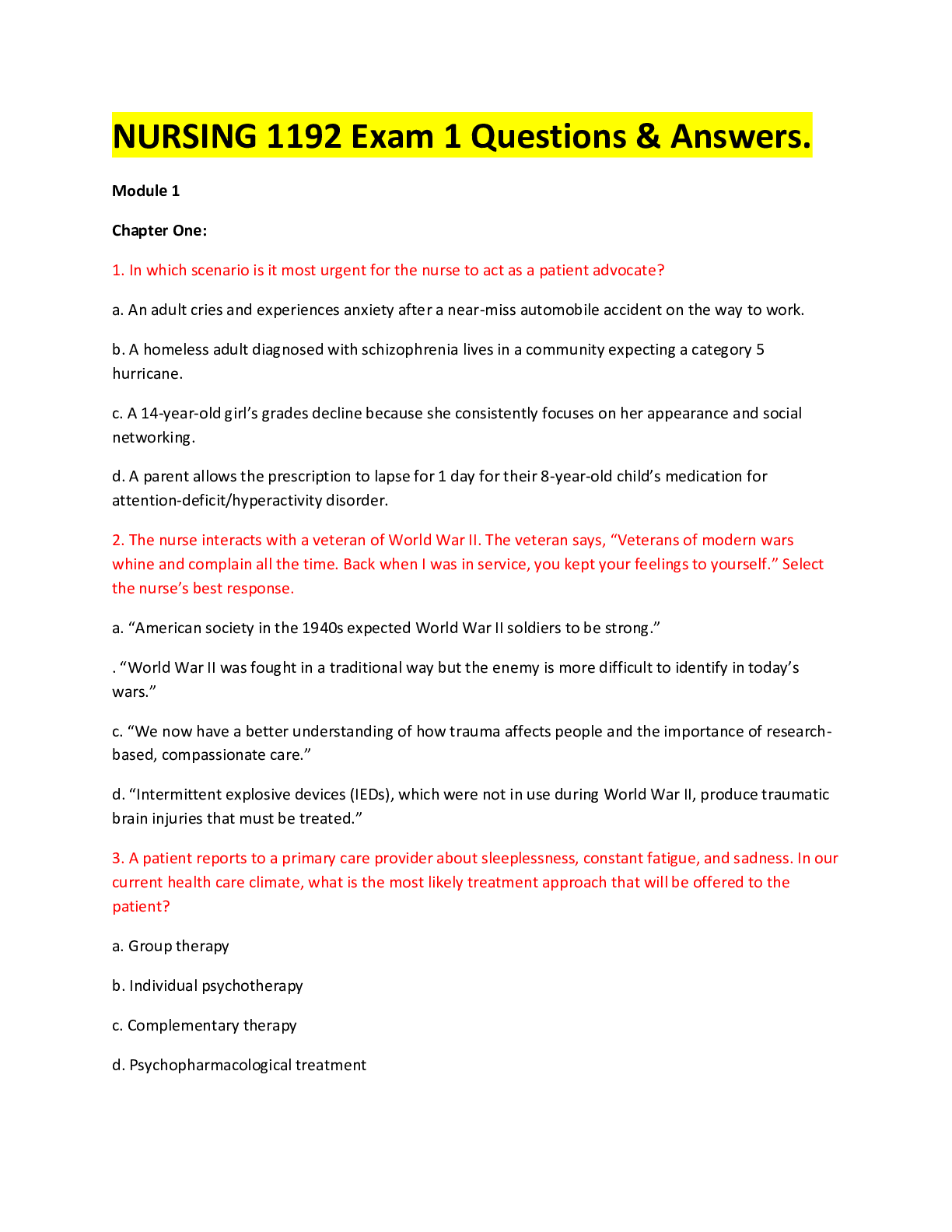
Buy this document to get the full access instantly
Instant Download Access after purchase
Buy NowInstant download
We Accept:

Reviews( 0 )
$12.00
Can't find what you want? Try our AI powered Search
Document information
Connected school, study & course
About the document
Uploaded On
Apr 09, 2020
Number of pages
21
Written in
Additional information
This document has been written for:
Uploaded
Apr 09, 2020
Downloads
0
Views
150

